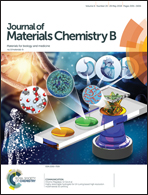Accelerated host angiogenesis and immune responses by ion release from mesoporous bioactive glass
Abstract
Angiogenesis represents a major focus for novel therapeutic approaches to the treatment and management of multiple pathological conditions, such as ischemic heart disease and critical-sized bone defect. The complex process of angiogenesis begins when cells within a tissue respond to hypoxia by increasing their production of vascular endothelial growth factor (VEGF). Loading biomaterials with angiogenic therapeutics have emerged as a promising approach for developing superior biomaterials for tissue repair and regeneration due to the possibility of reducing treatment costs and side effects when compared to the use of growth factors or genetic engineering approaches. Trace elements, such as copper (Cu), have been reported to be capable of inhibiting prolyl hydroxylases leading to the accumulation and activation of hypoxia-inducible factor-1α (HIF-1α), a major transcription factor regulating the expression of VEGF. It has also recently been speculated that the artifically induced hypoxic microenvironment may regulate the local immune response, which in turn, further facilitates the tissue repair process. The present study has incorporated ionic Cu2+ into mesoporous bioactive glass (MBG), a promising bioactive material system for regenerative medicine, and investigated its effect on angiogenesis and immune responses both in vitro and in vivo. Our results demonstrated that hypoxia-mimicking materials could induce VEGF secretion of bone marrow-derived mesenchymal stromal cells (BMSCs), which provided a positive feedback loop for early blood vessel formation by stimulating migration and tube formation of human umbilical vein endothelial cells (HUVECs). Furthermore, a tissue-regenerative macrophage subtype was triggered by Cu-MBG, leading to superior angiogenic responses (tube formation and angiogenic gene expression) compared to the traditional MBG material. It is concluded that the addition of inorganic ions leads to enhanced angiogenesis and immune responses, which holds promise for the development of functional tissue-engineered constructs to repair and regenerate damaged tissues and organs.



 Please wait while we load your content...
Please wait while we load your content...